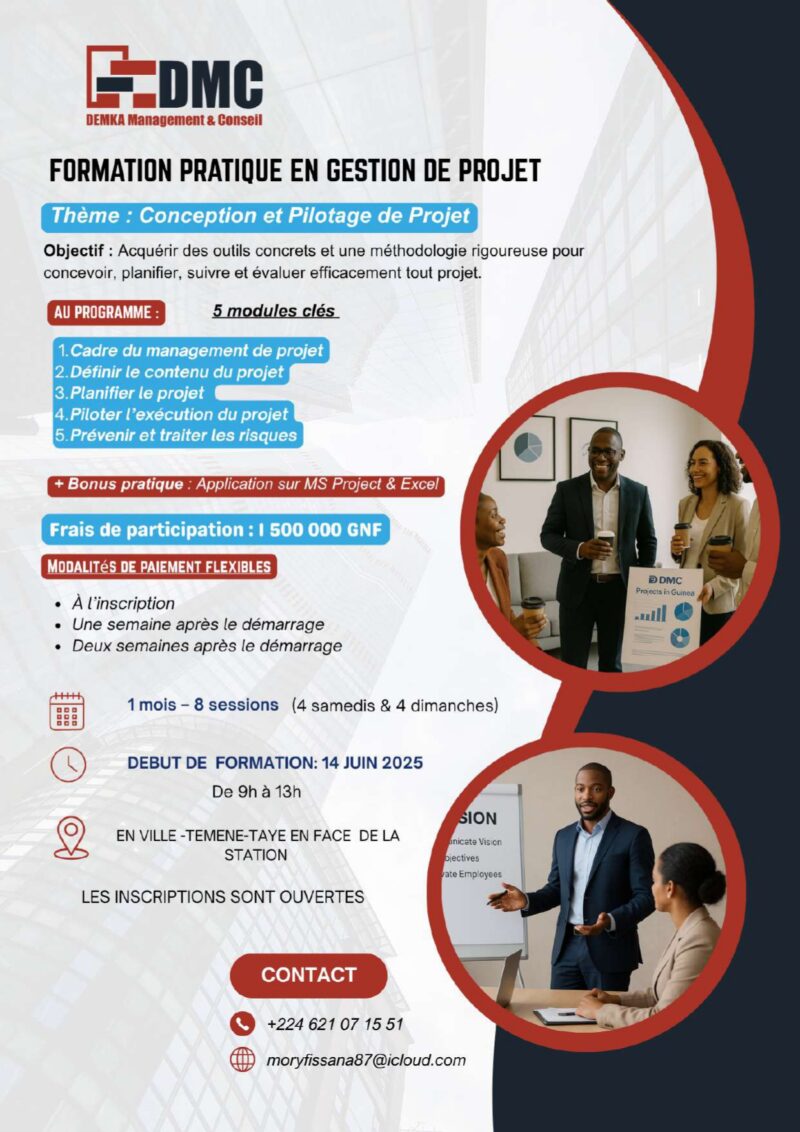> AVIS DE PUBLICATION DU CADRE DE GESTION ENVIRONNEMENTALE ET SOCIALE DU PROGRAMME DE DEVELOPPEMENT DES ZONES SPECIALES DE TRANSFORMATION AGRO INDUSTRIE DE BOKE ET KANKAN (PDZSTA-BK)
| Domaine : | GESTION DE PROJETS |
| Lieu d'affectation : | Guinée |


Non-Technical Summary
a. Background
Guinea requested the Bank’s support for the implementation of the Staple Crops Processing Zones (SCPZ) Programme - Promoting Sustainable Agricultural Value Chains. In connection with the objectives of the programme, Guinea has significant natural resources and potentials, such as water, energy, agro-sylvo-pastoral, wildlife, fishing, etc. However, a significant proportion of the population still lives below the poverty line. Agricultural production is unable to cover the country’s needs. For a very largely rural population (more than 70%), the small size of the cultivated areas and the low agricultural yields lead to impoverishment and food and nutrition insecurity for an overwhelming majority of the population. The Ebola epidemic (February 2014-1 June 2016), which claimed more than 2,500 lives, also affected the country’s economy.
Through the AfDB, the Green Climate Fund (GCF) will also contribute to the financing of additional SCPZ activities. Activities targeted by the GCF aim at reducing greenhouse gas emissions, enhancing carbon sinks, and enhancing the resilience of communities and ecosystems to climate change impacts.
The SCPZ, which will contribute to the diversification and improvement of agricultural production and value chains, will generate considerable positive impact and effects on local and national development as well as on natural resources management. However, some activities are also likely to generate potential adverse impact on the biophysical and human environments, if prevention or mitigation measures are not considered.
To this end, both the AfDB and the GCF have adopted safeguard policies which are mechanisms for mainstreaming environmental and social concerns during the cycle of projects submitted for financing. The SCPZ was classified as Category 1 and had therefore undergone a Strategic Environmental and Social Assessment (SESA) in 2019. The introduction of additional Green Climate Fund activities means that SCPZ requires the development of an Environmental and Social Management Framework (ESMF) in order to minimise potential adverse impacts and effects, and to enhance the programme’s benefits. Stemming from the consolidation of the SESA in 2019, the ESMF was developed in line with the policy and regulatory framework in force in the Republic of Guinea and the AfDB’s environmental and social safeguard policies.
b. Objective of the Environmental and Social Management Framework (ESMF)
The ESMF is a tool for the establishment of an environmental and social selection process and for the determination of when their precision will be well known based on the extent and nature of their potential impacts, as well as the class of sub-projects or activities to be implemented. It also ensures that the selection, appraisal and approval of sub-projects and their implementation comply with environmental laws and regulations and the commitments of the country concerned, and are consistent with the Bank’s environmental and social safeguard policies. In addition, the ESMF shall define the monitoring and surveillance framework, as well as the institutional measures and arrangements, possible capacity building needs and any other assistance to be provided before, during, and after the implementation of the programme.
However, it is important to point out that the ESMF does not replace the environmental impact assessments, however as a decision-making tool, it contributes significantly to the optimisation of development policies and programmes.
c. Brief Description of the Programme
SCPZ’s objective is to help enhance food and nutrition security in Guinea through the emergence of agro-industrial clusters in the Regions of Upper and Lower Guinea, especially in the prefectures of Kankan and Boké. In agreement with the Green Climate Fund (GCF), it was included into the basic draft of new activities aimed at combating climate change. With an estimated overall cost of USD 90 million, SCPZ is structured around the following four components and sub-components:
Télécharger le Document complet en PDF
Domaines d'Activité
-
1286 Avis
AUDIT & CONSULTANCE
-
1159 Avis
COMMERCE (VENTE, FOURNITURE, ACHAT)
-
893 Avis
GESTION - COMPTABILITÉ - RH
-
428 Avis
BTP (Batiment Travaux Publics)
-
292 Avis
TRANSPORT - LOGISTIQUE
-
280 Avis
NTIC & Informatique
-
270 Avis
indéfini
-
217 Avis
ENSEIGNEMENT - FORMATION - INSERTION
-
207 Avis
COMMUNICATION - JOURNALISME - MARKETING
-
150 Avis
FINANCE, BANQUES & ASSURANCE
-
150 Avis
Prestation de services
-
148 Avis
GESTION DE PROJETS
-
116 Avis
SANTÉ - PARAMÉDICAL
-
101 Avis
Ingénieurie
-
90 Avis
Netoyage, Aménagement & Entretien
-
58 Avis
Sécurité, Gardianage
-
52 Avis
Mines
-
44 Avis
SANTÉ - PARAMÉDICAL
-
38 Avis
DROIT
-
27 Avis
HÔTELLERIE - RESTAURATION - TOURISME
-
18 Avis
MÉCANIQUE - AUTOMOBILE
-
16 Avis
Partenariat
-
14 Avis
ONG
-
10 Avis
Evénementiel
-
10 Avis
COMMERCIAL, FREELANCE
-
9 Avis
Langues & Traduction
-
7 Avis
SECRÉTARIAT - ACCUEIL
-
1 Avis
INSTITUTIONS ET GOUVERNEMENT











